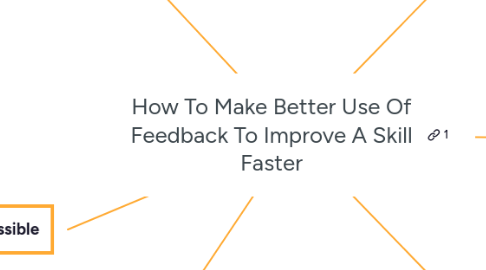How To Make Better Use Of Feedback To Improve A Skill Faster
by Danny Forest


1. Learn to listen
1.1. 'My greatest skill was being teachable. I was like a sponge. Even if I thought my coaches were wrong, I tried to listen and learn something.' -Michael Jordan
1.2. When someone gives you feedback, they are trying to help you improve
1.3. Do not take feedback personally
1.4. Ask for specific advice on how and what to do differently and ask questions to clarify what they mean
1.5. By becoming a better listener, you can concentrate on how the feedback will enable you to perform better
1.6. We can only learn when we realise why and what we are doing wrong
2. Believe that change is possible
2.1. Set specific goals of what you want to improve and think of ways to achieve them
2.2. By changing your actions, you find a way that works better
2.3. Don't enter a situation with no clear idea of how your actions contribute to reaching your goal
2.4. When you have a growth mindset, you see feedback as useful to help you perform better
3. Actively seek and embrace honest feedback
3.1. Embrace honest feedback, even if it may shatter the illusion you have of being quite good at something
3.2. The feedback can come from:
3.2.1. The task itself
3.2.1.1. For example: when throwing a ball, you can observe the results of your actions
3.2.2. a coach who is watching you from the outside
3.2.2.1. An experienced coach can help you realise mistakes that you perhaps didn't even know you were doing
